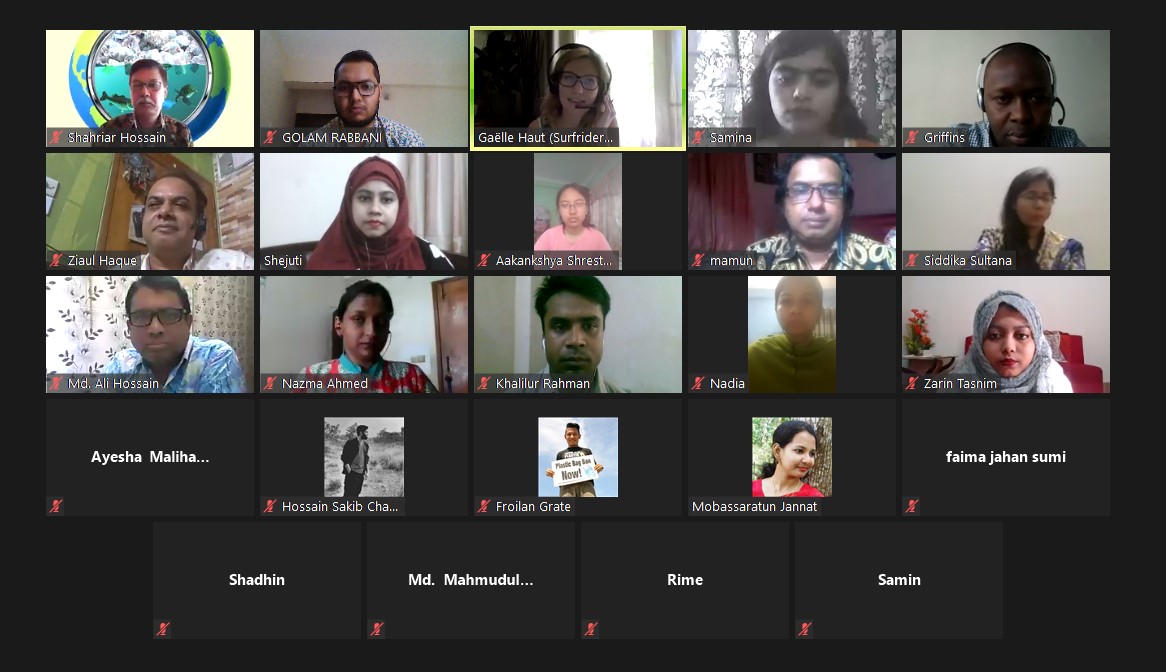International Plastic Bag Free Day 3rd July, 2020 – A Webinar Arranged by ESDO

The plastic bag is the single most issue of plastic pollution and marine litter globally and relating to coronavirus, COVID-19 virus transmits through plastic bags and other single-use plastics. And for that reason on the occasion of “International Plastic bag free day 2020”, experts and activists from around the world emphasize on plastic bag ban regulation and enforcement.
On July 3rd, 2020, ESDO arranged a webinar to discuss the significance of International Plastic Free Bag day and to promote and support a plastic bag free world for the greater sake of public health and welfare. ESDO also launched a poster regarding to the topic.
Environmental experts, activists and professionals attended the webinar and discussed about the need to promote plastic bag free living. About 50 participants, mostly students and youth representatives from Bangladesh, Nepal, Kenya, Bulgium participated the event virtually and expressed their solidarity with the global efforts to ban plastic bag and phase out single use plastics.
Mr. Griffins Orchieng, Programs Coordinator, Centre of Environmental Justice and Development – CEJAD, from Nairobi, Kenya; Gaëlle Haut, EU affairs Officer, Surfrider Foundation Europe, from Brussels, Belgium; Froilan Grate, Executive Director and Asia Pacific Coordinator, Global Alliance for Incinerator Alternatives-GAIA, from Manila, Philippines, and Md. Ziaul Haque, Director (AQM), Department of Environment (DoE) graced the webinar as the speakers. Dr. Shahriar Hossain, Secretary-General, ESDO, and Siddika Sultana, Executive Director, ESDO were also present at the meeting. DoE, Director Md. Ziaul Haque expressed his concern over the plastic bag usage condition in Bangladesh by saying that, “Despite being the pioneer nation to ban plastic bag in the world in 2002, Bangladesh is yet to completely phase out plastic bag usage owing to improper enforcement of the law. He urges all sections of the people to come forward and work hand in hand to execute the bag ban law and gradually phase out all single-use plastic for the greater sake of public health and environment.”
During the discussion, a theme presentation highlighted the shocking facts on plastic bags, that globally we use 5 trillion plastic bags per year! That’s 160,000 a second! And over 700 a year for every single person on the planet!
- About 2 million plastic bags are used every minute around the world (Earth Policy Institute). Most bags are simply thrown out and Less than 1% are recycled.
- Plastic bags are used for an average of 12 minutes. 100,000 marine animals are killed by plastic bags annually.
- Approximately 1 million sea birds also die from plastic!
- 10% of the plastic produced every year worldwide ends up in the ocean. 70% of which finds its way to the ocean floor, where it will likely never degrade.
Among marine organisms, it can cause immune suppression, reproductive insufficiency or acute poisoning. Ingesting polythene wrapped food is harmful to human health as well as it is, apparently, an agent of cancer, skin diseases, and other health problems. When burned, polythene releases hydrogen cyanide – an extremely hazardous gas causing severe air pollution.
Discussing about the detrimental impacts of plastic bag, session moderator Dr. Shahriar Hossain said, “Billions of plastic bags end up as litter each year and these bags are made of polypropylene, a material that is made from petroleum and natural gas. Both of these materials are non-renewable fossil fuel-based resources and throughout their extraction and production, they cause emission of greenhouse gases, which eventually contribute to global climate change and are also very harmful for the environment and human health”.
Executive Director of ESDO, Siddika Sultana said, “World right now is undergoing a pandemic situation which has put a halt to almost everything. But ESDO will continue its effort to raise public voice against ubiquitous production and use of single-use plastics around the globe including the plastic bags”.
Through this virtual meeting, the number of youth representatives was made informed about the harmful impacts of plastic bag usage and were subsequently encouraged to adopt eco-friendly alternatives to plastic bags. Considering the greater impact caused by the use of plastic bags, all the participants, including experts, activists, professionals, and the general public urged for immediate enforcement of plastic bag ban law in Bangladesh and enact plastic bag ban regulation around the world.





